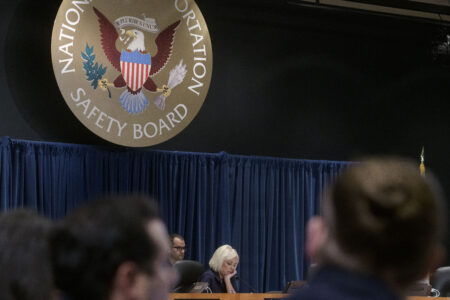Democrats address gay rights
Los Angeles ? The leading Democratic presidential candidates struck a delicate balance Thursday evening between showing commitment to expand the rights of gay people while justifying their opposition to same-sex marriage during the campaign’s first-ever televised forum focused on gay issues.
In an evening devoted to sensitive issues of sexuality and social mores, there were also riveting moments of frankness.
Openly lesbian rock star Melissa Etheridge, one of the questioners who’s originally from Leavenworth, Kan., greeted former Sen. John Edwards by bluntly asking him if he was “comfortable,” referring to a former Edwards campaign strategist’s assertion that Edwards once said he was uncomfortable around gay people.
The former senator from North Carolina responded with nervous laughter on Thursday night, assuring the audience he was comfortable and denying as “wrong” the report of the comment in a recently released book by Bob Shrum, a key adviser to his 2004 presidential campaign.
Perhaps the most personal question of the evening was posed to Sen. Hillary Clinton by Etheridge, who told Clinton that she had felt personally hurt and abandoned by the Clintons after President Bill Clinton’s inauguration.
“I remember when your husband was elected,” Etheridge said, calling it a “hopeful time” for gays and lesbians. But “in the years that followed, our hearts were broken. We were pushed aside. All those great promises that were made to us were broken.”
“What,” she asked, “are you going to do to be different than that?”
Clinton said she remembered things differently, recalling the political appointments, public remarks and “the ongoing struggle against (conservative Republican House Speaker Newt) Gingrich and the Republican majority.”
“We certainly didn’t get as much done as I would have liked,” Clinton said, “but there was a lot of honest effort.”
New Mexico Gov. Bill Richardson also appeared to wade into the contentious debate over whether homosexuality is an innate sexual orientation or a personal choice in a way that runs counter to the orthodoxies of gay political activists.
When asked the question, he responded, “It’s a choice.”
Richardson then went on to say that he doesn’t know enough about the science to “categorize” people.
“I’m not a scientist,” Richardson said. “I don’t see this as an issue of science or definition. I see gays and lesbians as human beings … I don’t like to categorize people.”
Sen. Barack Obama of Illinois turned to the history of the civil rights movement and his personal biography as the son of a mixed-race couple to counsel patience to gay couples who hope for the legal recognition of marriage.
Like all the Democratic candidates except Rep. Dennis Kucinich and former Sen. Mike Gravel, who both support gay marriage, Obama supports only civil unions for gay couples. He cited the need to “disentangle” the issue of legal rights for gay couples from what “has historically been the issue of the word ‘marriage,’ which has religious connotations to some people.”
For her part, Clinton called it a “mistake” that she did not more immediately condemn the recent comments of a top military officer who said that homosexuality is immoral, initially appearing to dodge questions about the remark and angering gay supporters. Obama also drew fire for what some called a weak response in the wake of the comments by Marine Gen. Peter Pace.
Clinton also defended her history on the “Don’t Ask, Don’t Tell” policy instituted in the American military during her husband’s administration, saying it was an “advance” in its time and that she hasn’t worked to repeal it because she didn’t want to do so with a Republican Congress and Republican president in charge.




